Medical Cannabis: Decriminalizing Sick Utahns
Authored by Connor Boyack, President
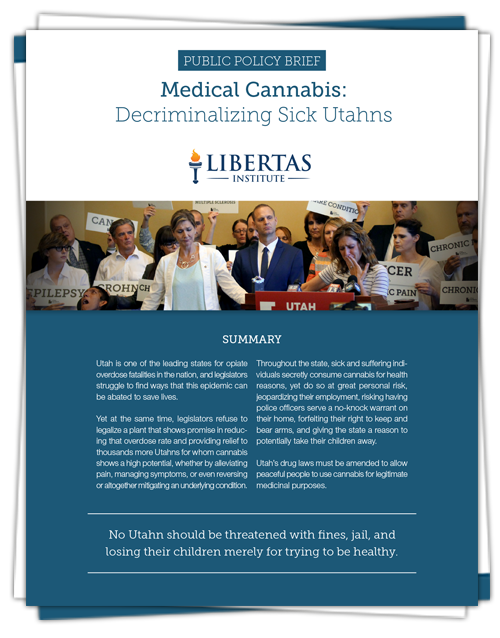 Utah is one of the leading states for opiate overdose fatalities in the nation, and legislators struggle to find ways that this epidemic can be abated to save lives.
Utah is one of the leading states for opiate overdose fatalities in the nation, and legislators struggle to find ways that this epidemic can be abated to save lives.
Yet at the same time, legislators refuse to legalize a plant that shows promise in reducing that overdose rate and providing relief to thousands more Utahns for whom cannabis shows a high potential, whether by alleviating pain, managing symptoms, or even reversing or altogether mitigating an underlying condition.
Throughout the state, sick and suffering individuals secretly consume cannabis for health reasons, yet do so at great personal risk, jeopardizing their employment, risking having police officers serve a no-knock warrant on their home, forfeiting their right to keep and bear arms, and giving the state a reason to potentially take their children away.
Utah’s drug laws must be amended to allow peaceful people to use cannabis for legitimate medicinal purposes.
Read the briefVehicle Safety Inspections: Another Wasteful Government Program
Authored by Audrey Carlston, Policy Analyst
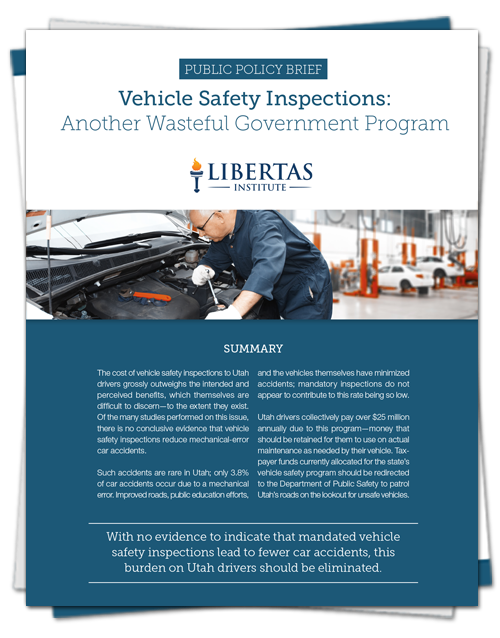 The cost of vehicle safety inspections to Utah drivers grossly outweighs the intended and perceived bene ts, which themselves are dif cult to discern—to the extent they exist. Of the many studies performed on this issue, there is no conclusive evidence that vehicle safety inspections reduce mechanical-error car accidents.
The cost of vehicle safety inspections to Utah drivers grossly outweighs the intended and perceived bene ts, which themselves are dif cult to discern—to the extent they exist. Of the many studies performed on this issue, there is no conclusive evidence that vehicle safety inspections reduce mechanical-error car accidents.
Such accidents are rare in Utah; only 3.8% of car accidents occur due to a mechanical error. Improved roads, public education efforts and the vehicles themselves have minimized accidents; mandatory inspections do not appear to contribute to this rate being so low.
Utah drivers collectively pay over $25 million annually due to this program—money that should be retained for them to use on actual maintenance as needed by their vehicle. Tax- payer funds currently allocated for the state’s vehicle safety program should be redirected to the Department of Public Safety to patrol Utah’s roads on the lookout for unsafe vehicles.
Read the briefCivil Asset Forfeiture: The Legalization of Theft
Authored by Connor Boyack, President
 Utah voters passed Initiative B in 2000 to protect property rights and due process by limiting the government’s authority to take ownership of a person’s property. Ever since then, police and prosecutors have attempted to undermine the expressed will of the voters.
Utah voters passed Initiative B in 2000 to protect property rights and due process by limiting the government’s authority to take ownership of a person’s property. Ever since then, police and prosecutors have attempted to undermine the expressed will of the voters.
Civil asset forfeiture allows the government to confiscate property from an individual who may not even be charged with a crime. This power has been abused around the nation, including in Utah.
Contrary to claims that this legal tool is used to go after drug kingpins and crime syndicates, 74% of forfeiture cases in Utah involve under $5,000 in assets. This low amount enables the government to easily take the property; a person whose small amount of cash was taken is unlikely to pay an attorney thousands of dollars to recover it.
Critics are correct to point out that civil asset forfeiture is legalized theft. At a minimum, it is a law in dire need of substantive reform.
Read the briefFood Truck Freedom: Removing Barriers for Mobile Businesses
Authored by Connor Boyack, President
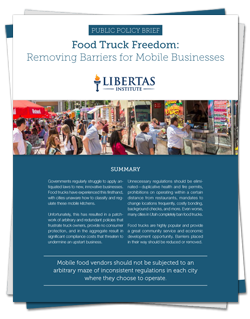 Governments regularly struggle to apply antiquated laws to new, innovative businesses. Food truck owners have experienced this firsthand, with cities unaware of how to best classify and regulate their mobile kitchens.
Governments regularly struggle to apply antiquated laws to new, innovative businesses. Food truck owners have experienced this firsthand, with cities unaware of how to best classify and regulate their mobile kitchens.
Unfortunately, this has resulted in a patchwork of arbitrary and redundant policies that frustrate truck owners, provide no consumer protection, and in the aggregate result in significant compliance costs that threaten to undermine an upstart business.
Unnecessary regulations should be eliminated—duplicative health and fire permits, prohibitions on operating within a certain distance from restaurants, mandates to change locations frequently, costly bonding, background checks, and more. Even worse, many cities in Utah completely ban food trucks.
Food trucks are highly popular and provide a great community service and economic development opportunity. Barriers placed in their way should be reduced or removed.
Read the briefEnsuring Justice through Juror Discretion
Authored by Josh Daniels, Director of Policy
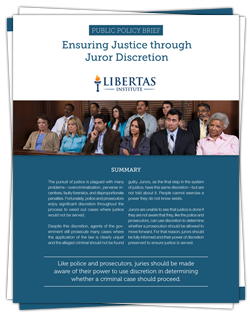 The pursuit of justice is plagued with many problems—over-criminalization, perverse incentives, faulty forensics, and disproportionate penalties. Fortunately, police and prosecutors enjoy significant discretion throughout the process to weed out cases where justice would not be served.
The pursuit of justice is plagued with many problems—over-criminalization, perverse incentives, faulty forensics, and disproportionate penalties. Fortunately, police and prosecutors enjoy significant discretion throughout the process to weed out cases where justice would not be served.
Despite this discretion, agents of the government still prosecute many cases where the application of the law is clearly unjust and the alleged criminal should not be found guilty. Jurors, as the final step in the system of justice, have this same discretion—but are not told about it. People cannot exercise a power they do not know exists.
Jurors are unable to see that justice is done if they are not aware that they, like the police and prosecutors, can use discretion to determine whether a prosecution should be allowed to move forward. For that reason, jurors should be fully informed and their power of discretion preserved to ensure justice is served.
Read the briefThe High Price of Retribution: A Case for Repealing the Death Penalty
Authored by Josh Daniels, Director of Policy
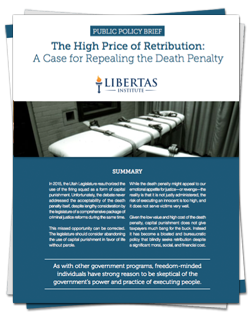 In 2015, the Utah Legislature reauthorized the use of the firing squad as a form of capital punishment. Unfortunately, the debate never addressed the acceptability of the death penalty itself, despite lengthy consideration by the legislature of a comprehensive package of criminal justice reforms during the same time.
In 2015, the Utah Legislature reauthorized the use of the firing squad as a form of capital punishment. Unfortunately, the debate never addressed the acceptability of the death penalty itself, despite lengthy consideration by the legislature of a comprehensive package of criminal justice reforms during the same time.
This missed opportunity can be corrected. The legislature should consider abandoning the use of capital punishment in favor of life without parole.
While the death penalty might appeal to our emotional appetite for justice—or revenge—the reality is that it is not justly administered, the risk of executing an innocent is too high, and it does not serve victims very well.
Given the low value and high cost of the death penalty, capital punishment does not give taxpayers much bang for the buck. Instead it has become a bloated and bureaucratic policy that blindly seeks retribution despite a significant moral, social, and financial cost.
Read the brief